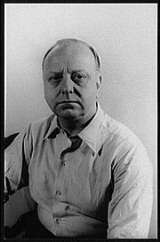
Virgil Thomson
Virgil Thomson was an American composer from Missouri, whose rural background gave a sense of place in his compositions. He studied with Nadia Boulanger, and later established himself in New York City, as a peer of Aaron Copland and was also a music critic for the New York Herald-Tribune from 1940 through 1954. He won the Pulitzer Prize for Music in 1949 with his film score for Louisiana Story.
Sourced
- I got myself into a lovely little--shall we say controversy--with André Breton, by pointing out that the discipline of spontaneity, which he was asking his surrealist neophytes to adopt, was new for language but something that composers had been practicing for centuries.
- Virgil Thomson (1981). A Virgil Thomson Reader, p.548. New York: E.P. Dutton Inc.
- See: André Breton
- Virgil Thomson (1981). A Virgil Thomson Reader, p.548. New York: E.P. Dutton Inc.
Attributed
- Falsely conceived and rather clumsily executed crooked folklore and halfway opera. (Thomson's opinion of Porgy and Bess)
- I don't care what other critics say, I only hope to be played.
- I don't go around regretting things that don't happen.
- I don't have to worry. No matter what they do to it, it works.
- I let her alone and when she got that finished she left me alone. We trusted each other.
- I look at you and I write down what I hear.
- I never learned to verbalize an abstract musical concept. No thank you. The whole point of being a serious musician is to avoid verbalization whenever you can.
- I said to my friends that if I was going to starve, I might as well starve where the food is good.
- I seem to write an opera about every 20 years; if you live long enough you can write four operas. I finished my third in 1970.
- I thought of myself as a species of knight errant attacking dragons single-handedly and rescuing musical virtue in distress.
- I've never known a musician who regretted being one. Whatever deceptions life may have in store for you, music itself is not going to let you down.
- In Paris, you learn wit, in London you learn to crush your social rivals, and in Florence you learn poise.
- Let your mind alone, and see what happens.
- Musicians own music because music owns them.
- Reviewing music or reviewing anything is a writing job. It's nice if you are experienced in the field you are writing about, but writing is what you are doing.
- The description and explanation is the best part of music reviewing. There is such a thing, and you know it too, as a gift for judgment. If you have it, you can say anything you like. If you haven't got it, you don't know you haven't got it. And everything you say will be held against you.
- The way to write American music is simple. All you have to do is be an American and then write any kind of music you wish.
- They look better than we do; they can wear all colors on stage. We're sort of oyster-colored.
- Try a thing you haven't done three times. Once, to get over the fear of doing it. Twice, to learn how to do it. And a third time to figure out whether you like it or not.
- You explain how it went, and as far as you can figure out how it got that way.
